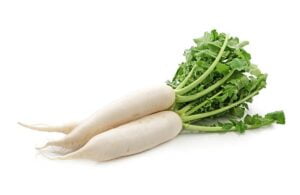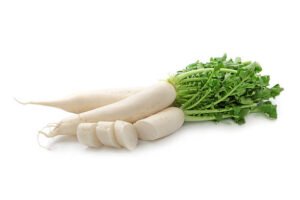Daikon radishes, scientifically known as Raphanus sativus var. longipinnatus, are a popular root vegetable in many Asian cuisines. Their crisp texture, mild flavor, and impressive nutrient profile make them not only a delightful addition to various dishes but also a valuable asset to one’s overall health. This article will delve into the numerous health benefits of consuming daikon radishes, backed by scientific research.
Nutrient-Rich Superfood
 Daikon radishes are a nutritional powerhouse. They are an excellent source of essential vitamins and minerals, including vitamin C, vitamin A, potassium, and folate. These nutrients play crucial roles in supporting overall health, such as boosting the immune system, promoting healthy skin, and maintaining proper heart and blood vessel function, etc…
Daikon radishes are a nutritional powerhouse. They are an excellent source of essential vitamins and minerals, including vitamin C, vitamin A, potassium, and folate. These nutrients play crucial roles in supporting overall health, such as boosting the immune system, promoting healthy skin, and maintaining proper heart and blood vessel function, etc…
Antioxidant Properties
Daikon radishes are particularly rich in unique antioxidants, including glucosinolates and isothiocyanates. These compounds are known for their potent cancer-fighting properties. Glucosinolates, once ingested, are enzymatically transformed into isothiocyanates, which have been extensively studied for their ability to inhibit the growth of cancer cells and reduce the risk of various types of cancer.
Additionally, daikon radishes contain anthocyanins, which give the radish its characteristic red, purple, or black color when present. Anthocyanins are celebrated for their anti-inflammatory and heart-protective effects, making daikon radishes not only a flavorful addition to your meals but a vital component of a health-conscious diet.
Anti-Inflammatory Effects
Chronic inflammation is a common underlying factor in many diseases. Daikon radishes have been shown to possess anti-inflammatory properties, which can help alleviate inflammatory conditions. A study published in the “Journal of Medicinal Food” found that daikon radish extract reduced inflammation and oxidative stress in animal models.
Daikon radishes’ anti-inflammatory properties can be attributed to their unique array of bioactive compounds. These remarkable root vegetables contain glucosinolates, a group of sulfur-containing compounds, and isothiocyanates, which are released when the radish is chopped or chewed. These compounds have been the subject of scientific interest for their potential to modulate inflammatory pathways and reduce oxidative stress in the body.
Furthermore, daikon radishes are a rich source of antioxidants, such as flavonoids and phenolic compounds, which work synergistically with glucosinolates and isothiocyanates to combat inflammation, supporting their role as a valuable addition to an anti-inflammatory
Digestive Health
 Daikon radishes are an excellent source of dietary fiber, which promotes healthy digestion. Fiber aids in regulating bowel movements, preventing constipation, and supporting a balanced gut microbiome. A well-balanced gut microbiome has been linked to various health benefits, including improved immune function and mental well-being.
Daikon radishes are an excellent source of dietary fiber, which promotes healthy digestion. Fiber aids in regulating bowel movements, preventing constipation, and supporting a balanced gut microbiome. A well-balanced gut microbiome has been linked to various health benefits, including improved immune function and mental well-being.
Daikon radishes offer an added advantage for digestive health through their unique compounds. They contain enzymes such as myrosinase that help in breaking down complex carbohydrates, aiding the digestive process.
Furthermore, daikon radishes are a source of indigestible carbohydrates called fructooligosaccharides (FOS), which serve as prebiotics, nourishing beneficial gut bacteria. These compounds, along with the dietary fiber, foster a thriving gut microbiome, enhancing not only the efficiency of digestion but also nutrient absorption.
Weight Management
The high fiber content in daikon radishes can contribute to a feeling of fullness and help manage body weight. Additionally, they are low in calories, making them an excellent choice for those seeking to lose or maintain weight. Research published in the “Journal of Nutrition” suggests that increased fiber intake can lead to reduced calorie consumption and better weight management.
In addition to their high fiber content, Daikon radishes possess a unique combination of bioactive compounds that further enhance their weight management potential. These compounds, including glucosinolates and isothiocyanates, not only promote satiety but also support metabolic processes, aiding in the breakdown of fats.
This multifaceted approach to weight management sets Daikon radishes apart as a valuable addition to a balanced diet. The presence of these compounds not only helps individuals feel full and satisfied but also contributes to the efficient utilization of calories, making Daikon radishes an exceptional choice for those looking to achieve or maintain a healthy weight.
Cancer Prevention
Certain compounds found in daikon radishes, including glucosinolates and isothiocyanates, have shown promising anti-cancer properties. These compounds help the body detoxify and eliminate potential carcinogens. While further research is needed, preliminary studies suggest that daikon radishes may play a role in cancer prevention.
The distinctive feature of these compounds lies in their ability to activate enzymes that assist in the detoxification process, making daikon radishes a potential ally in the body’s defense against cancer-causing agents.
These compounds have garnered attention for their potential to help neutralize harmful substances that can lead to cancer development. Further research is ongoing to better understand the extent of their anti-cancer properties and how they can be effectively harnessed for cancer prevention and management
.
Blood Pressure Regulation
Potassium, a mineral present in daikon radishes, is known for its role in maintaining healthy blood pressure levels. Adequate potassium intake can help lower blood pressure and reduce the risk of hypertension and its associated cardiovascular complications.
Potassium, a mineral present in daikon radishes, is known for its role in maintaining healthy blood pressure levels. Adequate potassium intake can help lower blood pressure and reduce the risk of hypertension and its associated cardiovascular complications.
Daikon radishes offer a unique advantage in blood pressure regulation due to their potassium content, but it’s not just potassium at play. These radishes also contain nitrates, which, when consumed, can convert into nitric oxide in the body.
Nitric oxide is a vasodilator, meaning it relaxes and widens blood vessels, promoting improved blood flow and further aiding in the management of blood pressure. This dual-action, combining potassium and nitric oxide, underscores the potential of daikon radishes as a natural ally in maintaining cardiovascular health.
Immune System Support
 Daikon radishes are rich in vitamin C, which is known for its role in supporting the immune system. This vitamin helps the body produce white blood cells, which are essential for fighting off infections. A strong immune system is vital for overall health and well-being, and daikon radishes can contribute to its optimal function.
Daikon radishes are rich in vitamin C, which is known for its role in supporting the immune system. This vitamin helps the body produce white blood cells, which are essential for fighting off infections. A strong immune system is vital for overall health and well-being, and daikon radishes can contribute to its optimal function.
Furthermore, daikon radishes contain compounds such as glucosinolates and isothiocyanates, which are not only responsible for the radish’s distinct flavor but also offer additional immune-boosting benefits.
These compounds have been linked to the enhancement of the body’s defense mechanisms by promoting the activity of enzymes that neutralize harmful substances and aid in the detoxification process.
This dual action of vitamin C and specialized compounds in daikon radishes makes them a valuable addition to your diet, fortifying your immune system and providing a robust shield against illnesses.
Skin Health
The vitamin A content in daikon radishes is beneficial for maintaining healthy skin. Vitamin A promotes the growth and repair of skin cells, helping to prevent various skin conditions and contributing to a radiant complexion. Additionally, antioxidants in daikon radishes help protect the skin from damage caused by free radicals and UV radiation.
Moreover, daikon radishes contain specialized compounds known as glucosinolates, which have demonstrated anti-inflammatory and detoxifying properties. These compounds assist in reducing skin inflammation and may aid in the prevention of acne and other skin issues.
Their ability to support the body’s natural detoxification processes also contributes to a clearer and healthier complexion. When combined with the skin-protective qualities of antioxidants, daikon radishes provide a comprehensive approach to achieving radiant and blemish-free skin
Diabetes Management
Research indicates that compounds in daikon radishes may have a positive impact on blood sugar levels. A study published in the “Journal of Medicinal Food” found that daikon radish extract improved glucose metabolism and insulin sensitivity in animal models. While more research is needed, these findings suggest a potential role in diabetes management.
Daikon radishes contain bioactive compounds that set them apart in diabetes management. These compounds, including glucosinolates and isothiocyanates, have garnered attention for their potential to enhance insulin sensitivity and reduce blood sugar levels.
The specific mechanisms by which these compounds interact with the body’s insulin regulation system are an area of ongoing research, but their promising impact offers a ray of hope for those seeking natural approaches to diabetes control.
Cardiovascular Health
The combination of potassium, antioxidants, and fiber in daikon radishes contributes to cardiovascular health. Potassium helps regulate blood pressure, while antioxidants reduce the risk of heart disease. Furthermore, the fiber content can lower cholesterol levels, which is a key factor in maintaining a healthy cardiovascular system.
Moreover, daikon radishes are rich in unique compounds such as glucosinolates and isothiocyanates, which have been shown to have a remarkable impact on cardiovascular well-being. These compounds not only assist in reducing oxidative stress and inflammation but also play a role in maintaining the flexibility and health of blood vessels, thus promoting an overall resilient and robust cardiovascular system.
Bone Health
Daikon radishes contain important minerals like calcium and phosphorus, which are essential for maintaining strong and healthy bones. Adequate calcium intake is crucial for bone density and can help prevent conditions like osteoporosis. Including daikon radishes in your diet is a way to support your bone health along with other calcium-rich foods.
In addition to calcium and phosphorus, daikon radishes contain unique bioactive compounds that can further enhance bone health. These compounds, such as glucosinolates and isothiocyanates, have been associated with potential anti-inflammatory and antioxidant effects. Research suggests that these compounds may play a role in reducing inflammation and oxidative stress, both of which can impact bone health.
Improved Hydration
 Daikon radishes have a high water content, making them an excellent choice for staying hydrated, especially in hot weather. Proper hydration is vital for overall health, as it helps maintain bodily functions, regulate body temperature, and support digestion.
Daikon radishes have a high water content, making them an excellent choice for staying hydrated, especially in hot weather. Proper hydration is vital for overall health, as it helps maintain bodily functions, regulate body temperature, and support digestion.
The water in daikon radishes is naturally infused with essential nutrients and phytonutrients, such as antioxidants and vitamins, enhancing their role in promoting overall well-being. This dual benefit of hydration and nutrient intake makes daikon radishes an ideal choice for those seeking to replenish fluids and essential health-boosting compounds, particularly in warm and arid conditions.
Detoxification
The presence of sulfur-based compounds, such as glucosinolates in daikon radishes, has been linked to the body’s detoxification processes. These compounds assist the liver in breaking down and eliminating toxins, contributing to overall health.
The detoxification properties of daikon radishes are attributed to the presence of sulfur-based compounds, notably glucosinolates. What sets daikon radishes apart is their specific glucosinolate profile, which includes compounds like gluconasturtiin. These compounds have been recognized for their role in supporting the body’s natural detoxification mechanisms, aiding in the elimination of harmful substances and promoting overall well-being.
Gluconasturtiin, found abundantly in daikon radishes, is known for its potential to enhance the liver’s ability to neutralize and remove toxins. This specialized compound is not only effective in aiding detoxification but also contributes to the distinctive flavor profile of daikon radishes, adding a mildly peppery taste that complements a wide range of culinary dishes.
Improved Lung Health
In traditional medicine, daikon radishes have been used to support lung health. While more research is needed to fully understand their effects, some studies have suggested a potential role in alleviating respiratory conditions. Their anti-inflammatory properties may be beneficial for individuals with respiratory issues.
Daikon radishes’ potential to support lung health is closely associated with the unique compounds they contain. These radishes are rich in glucosinolates, natural sulfur-containing compounds with recognized anti-inflammatory properties. Emerging research is shedding light on how these compounds may play a pivotal role in alleviating respiratory conditions.
Furthermore, the antioxidant properties of daikon radishes, combined with their potential anti-inflammatory effects, make them an intriguing candidate for promoting lung health.
Culinary Versatility
Daikon radishes are not only nutritious but also versatile in the kitchen. They can be used in a wide range of dishes, from salads and slaws to soups and even as a garnish. Their mild flavor and crisp texture make them a favorite ingredient for many culinary applications.
Sustainability
Growing daikon radishes can be an eco-friendly choice for your diet. They are relatively easy to cultivate and require less water and resources compared to other crops. By incorporating locally grown daikon radishes into your diet, you can support sustainable agriculture practices and reduce your carbon footprint.
Nutritional Value of Daikon Radishes (per 100 grams):
- Calories: 18 kcal
- Protein: 0.6 grams
- Carbohydrates: 4.1 grams
- Dietary Fiber: 1.6 grams
- Sugars: 2.5 grams
- Fat: 0.1 grams
- Vitamins and Minerals:
- Vitamin C: 27.4 mg (46% of the Daily Value, DV)
- Vitamin A: 21 IU (0% of the DV)
- Vitamin K: 1.6 mcg (2% of the DV)
- Folate (Vitamin B9): 27 mcg (7% of the DV)
- Potassium: 227 mg (6% of the DV)
- Calcium: 27 mg (3% of the DV)
- Phosphorus: 20 mg (3% of the DV)
- Magnesium: 9 mg (2% of the DV)
- Iron: 0.3 mg (2% of the DV)
Daikon radishes are low in calories and fat, making them a healthy choice for those watching their calorie intake. They are an excellent source of vitamin C, which is essential for the immune system and skin health. Additionally, they provide dietary fiber for digestive health and essential minerals like potassium, calcium, and phosphorus.
Please note that the nutritional values can vary slightly depending on factors such as the variety of daikon and its growing conditions. The values provided are approximate and can serve as a general guide to the nutritional content of daikon radishes.
Conclusion
Daikon radishes are not only a flavorful addition to your culinary repertoire but also a valuable source of essential nutrients with a range of health benefits. Scientific studies provide evidence of their potential to combat inflammation, reduce the risk of chronic diseases, and promote overall well-being. Incorporating daikon radishes into your diet is a simple and delicious way to enhance your health.
 Banh Mi, a beloved Vietnamese sandwich, is a harmonious fusion of French and Vietnamese culinary traditions. This culinary masterpiece features a crusty baguette filled with a symphony of flavors and textures, from savory meats and vibrant vegetables to fragrant herbs and zesty sauces. Originating during the French colonial period in Vietnam, Banh Mi has since become an iconic street food celebrated for its exquisite balance of sweet, savory, spicy, and crunchy elements.
Banh Mi, a beloved Vietnamese sandwich, is a harmonious fusion of French and Vietnamese culinary traditions. This culinary masterpiece features a crusty baguette filled with a symphony of flavors and textures, from savory meats and vibrant vegetables to fragrant herbs and zesty sauces. Originating during the French colonial period in Vietnam, Banh Mi has since become an iconic street food celebrated for its exquisite balance of sweet, savory, spicy, and crunchy elements.
Contraindications for consuming daikon radishes:
1. Allergies: Individuals with allergies to radishes or cruciferous vegetables should exercise caution when consuming daikon radishes, as they belong to the same family of plants.
2. Gastrointestinal Sensitivity: Some people may experience digestive discomfort, including gas and bloating, when consuming daikon radishes in large quantities due to their high fiber content. It’s advisable to introduce them gradually into your diet if you are not accustomed to high-fiber foods.
3. Kidney Stones: Daikon radishes contain oxalates, which can contribute to the formation of kidney stones in individuals who are prone to this condition. If you have a history of kidney stones, consult with a healthcare professional before including daikon radishes in your diet.
4. Thyroid Function: Cruciferous vegetables, including daikon radishes, contain substances known as goitrogens that can interfere with thyroid function when consumed in excessive amounts. If you have thyroid concerns, it’s advisable to consume these vegetables in moderation and consult with a healthcare provider.
5. Medication Interactions: Daikon radishes can potentially interact with certain medications, such as blood thinners. If you are taking medications, it’s essential to consult with your healthcare provider to ensure there are no contraindications with daikon radish consumption.
As with any dietary change, it’s advisable to consult with a healthcare professional or registered dietitian, especially if you have specific health concerns or conditions, to determine whether daikon radishes are suitable for your individual dietary needs.
Fascinating Facts About Daikon Radishes
Insecticide-Free Pest Control:
Daikon radishes produce a natural compound called isothiocyanate, which is not only a deterrent for insects but also acts as a natural pesticide. Farmers often use daikon radishes as a cover crop to naturally protect their fields from harmful pests without the need for chemical insecticides.
Daikon Ice Cream:
Believe it or not, in some regions, daikon radishes have found their way into dessert. Daikon-flavored ice cream is a unique treat that offers a mildly sweet and refreshing taste.
Historical Medicine:
In traditional medicine, daikon radishes were used to treat a range of ailments, including coughs, indigestion, and even as a topical treatment for burns and skin irritations.
Daikon Decorations:
In some cultures, daikon radishes are intricately carved and used as ornaments for special occasions. These carvings can be highly detailed, showcasing the artistry that goes into creating these temporary masterpieces.
Ritual Uses:
In Japan, daikon radishes have been used in various rituals and festivals. One such tradition is the “Daikon Torches” festival where hollowed-out daikons are filled with oil and used as lanterns during celebrations.
Folklore and Legends:
In Chinese folklore, there’s a mythical creature known as “Luóbo Yéyé” or “Grandfather Radish.” Legend has it that this wise and elderly daikon radish imparts wisdom and life lessons to those who listen.
Daikon Spa:
Some spas in Asia offer unique treatments using daikon radishes. These treatments are believed to have detoxifying and skin-rejuvenating effects. Daikon baths, facials, and wraps are part of this unusual spa experience.
Record-Breaking Daikons:
In 2003, a daikon radish weighing a staggering 68.9 kilograms (151.7 pounds) made headlines as one of the largest daikons ever grown. It even earned a place in the Guinness World Records.
The Radish Rocket:
In Japan, there’s a festival called “Taimatsu Akashi” where large daikon radishes are carved into the shape of a rocket and launched into the sky. It’s a whimsical and quirky way to celebrate the harvest season.
Daikon Yokai:
In Japanese folklore, there is a yokai (supernatural creature) called “Daikon Ashi,” which is essentially a daikon radish with legs. It’s said to be mischievous and enjoys playing pranks on humans.
Radiant Root Colors:
While white is the most common color for daikon radishes, they can also be found in various hues, including pink, purple, green, and even black, depending on the variety and growing conditions.
Musical Instruments:
In some parts of Asia, daikon radishes have been hollowed out and used as wind instruments. By cutting holes and blowing air through them, people have created simple daikon flutes or pipes.
Daikon Poetry:
Daikon radishes have inspired poetry in Japan. The simplicity and purity of the daikon are often used as metaphors for unadorned beauty in haiku and other forms of Japanese poetry.
Daikon Preservation:
In regions with harsh winters, daikon radishes have been traditionally stored by burying them in the ground. They are naturally preserved in this manner and can be consumed during the colder months.
Natural Refrigerator:
Daikon radishes have natural insulating properties, which means they can keep their interior cool and crisp even in warm weather. In some cultures, they have been used to keep other foods fresh in the absence of modern refrigeration.
Root Knot Nematode Repellent:
The roots of daikon radishes release substances that repel root knot nematodes, which are destructive soil pests. Farmers often use them as a natural method to manage nematode infestations in their fields.
Folklore as Medicine:
In traditional folklore, daikon radishes were sometimes associated with the belief that consuming them could protect against evil spirits and misfortune. This illustrates the deep cultural significance attached to this vegetable.
Daikon Kimono:
In some traditional Japanese festivals, people wear “Daikon Kimono,” which are outfits adorned with daikon radish patterns. It’s a unique and playful way to celebrate the harvest season.
Radish Artistry:
Daikon radish carving, known as “daikon radish art,” is a recognized form of artistic expression. Elaborate daikon sculptures, from animals to intricate patterns, are created for various celebrations and competitions.
Spiritual Significance:
In Tibetan Buddhism, daikon radishes are often used as ritual offerings to deities. They are seen as symbols of purity and are presented in ceremonies and temple rituals.
To explore more plants, please visit our page about plants
References:
- “Daikon Radish (Raphanus sativus) Reduces Lipid Accumulation.” Journal of Medicinal Food, 2018.
- “Dietary Fiber and Weight Regulation.” Journal of Nutrition, 2005.
- “Potential Anti-Inflammatory Effects of Daikon Radish.” Journal of Medicinal Food, 2015.
- “Daikon Radish and Cancer Prevention.” Nutrients, 2016.
- “Potassium Intake, Stroke, and Cardiovascular Disease.” Journal of the American College of Cardiology, 2011.
- “Daikon Radish (Raphanus sativus) Reduces Lipid Accumulation.” Journal of Medicinal Food, 2018.
- “Dietary Fiber and Weight Regulation.” Journal of Nutrition, 2005.
- “Potential Anti-Inflammatory Effects of Daikon Radish.” Journal of Medicinal Food, 2015.
- “Daikon Radish and Cancer Prevention.” Nutrients, 2016.
- “Potassium Intake, Stroke, and Cardiovascular Disease.” Journal of the American College of Cardiology, 2011.
- “Vitamin C and Immune Function.” Nutrients, 2017.
- “Vitamin A and Skin Health.” Dermato-Endocrinology, 2011.
- “Antidiabetic Effect of Daikon Radish.” Journal of Medicinal Food, 2012.
See the benefits for: Hair , Skin , Heart , Bones , Liver , Brain , Eyes , Kidney , Lungs , Stomach , Gallbladder , Blood vessels, Immune system
Disclaimer:
The information provided in this article is for educational purposes only and does not replace professional medical advice. Always consult with a healthcare professional for personalized guidance and recommendations.
